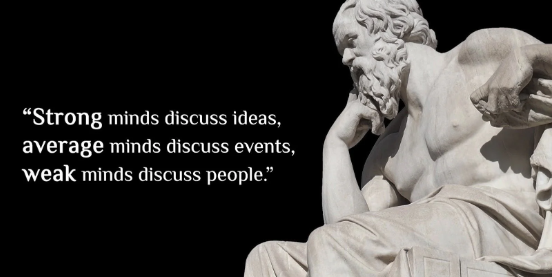The Written Word
A Double-Edged Sword of Memory
The philosopher who expressed concerns about the
introduction of the written word and its impact on memory was Socrates.
This idea is conveyed through a dialogue written by his student, Plato,
in the work Phaedrus. Socrates argued that writing would lead
to forgetfulness in learners because they would rely on written texts instead
of their own memories12.
The advent of the written word, a monumental leap in human
history, was met with both awe and apprehension. While it offered a means to
preserve knowledge and transmit it across generations, there was also a fear
that it might erode the capacity for human memory. Plato, the renowned
Greek philosopher, expressed such concerns in his dialogue Phaedrus. He
argued that the reliance on writing would lead to "forgetfulness in the learner's souls,"
as they would no longer need to exercise their memories to recall information.
Plato's fear is rooted in the understanding that memory is
not merely a storage device for information but a cognitive process that is
essential for learning and understanding. When we actively recall information,
we engage in a process of reconstruction, connecting new knowledge with
existing schemas. This process strengthens neural connections and enhances our
ability to think critically and creatively.
However, the fear that the written word would lead to a
decline in memory is not entirely unfounded. The ease with which we can access
information through writing can lead to a reliance on external sources and a
neglect of our own cognitive abilities. When we can simply look up a fact
rather than recalling it from memory, we miss out on the opportunity to
strengthen our mental faculties.
Moreover, the nature of written information can limit the
depth and breadth of our understanding. While writing can provide a precise and
structured account of facts, it cannot capture the nuances and complexities of
human experience. The spoken word, with its intonation, body language, and
context, can convey a richness of meaning that is often lost in translation.
Despite these concerns, the written word has undoubtedly had
a profound impact on human civilization. It has enabled the preservation of
knowledge, facilitated the development of science and technology, and fostered
the growth of culture and society. However, it is essential that we recognize
the limitations of written information and strive to balance our reliance on
external sources with the cultivation of our own cognitive abilities.
In conclusion, the introduction of the written word was a
double-edged sword. While it offered immense benefits, it also raised concerns
about its potential to erode human memory. By understanding the nature of
memory and the limitations of written information, we can harness the power of
the written word while preserving our capacity for critical thinking and
creative expression.
The Impact of AI on Memory
A Philosophical Exploration
The advent of artificial intelligence (AI) has raised new
questions about the nature of human cognition, including our reliance on
memory. While the written word was once feared to lead to a decline in memory,
AI presents a different challenge: the potential for vast, easily accessible
knowledge repositories that could make human memory seem redundant.
A New Form of Forgetfulness?
Just as Plato feared that writing would lead to
"forgetfulness in the learner's souls," there is a concern that AI
could create a similar cognitive dependency. If we can simply ask an AI
assistant for any piece of information, why bother memorizing it? This could
lead to a decline in our ability to recall facts and details, as well as our
capacity for critical thinking and problem-solving.
The Benefits of Human Memory
However, human memory is more than just a storage device for
facts. It plays a crucial role in our ability to understand and interpret
information, to make connections between different ideas, and to develop a
sense of self. When we actively recall information, we engage in a process of
reconstruction, connecting new knowledge with existing schemas. This process
strengthens neural connections and enhances our cognitive abilities.
AI as a Tool, Not a Replacement
AI can be a valuable tool for augmenting our memory and
cognitive abilities. It can help us to access information quickly and
efficiently, to identify patterns and trends in data, and to generate new
ideas. However, it is important to recognize that AI is not a substitute for
human intelligence. We still need to exercise our own critical thinking skills,
to evaluate the information we receive, and to apply it creatively to solve
problems.
The Future of Memory
As AI continues to evolve, it is likely that our
relationship with memory will also change. We may become more reliant on AI to
store and retrieve information, but this does not mean that human memory will
become obsolete. Instead, we may need to develop new ways of using our memories
in conjunction with AI to enhance our cognitive abilities and to create a more
meaningful and fulfilling life.
In conclusion, while the fear that AI will lead to a decline
in human memory is not entirely unfounded, it is important to recognize the
limitations of AI and the unique value of human cognition. By understanding the
role of memory in human life and the potential benefits of AI, we can harness
the power of technology while preserving our capacity for critical thinking,
creativity, and human connection.

Comments
Post a Comment